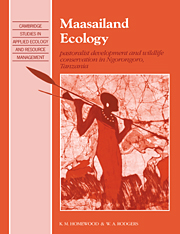Book contents
- Frontmatter
- Contents
- Preface
- 1 Management problems and applied ecology in Ngorongoro Conservation Area
- 2 Ngorongoro Conservation Area
- 3 Maasai of Ngorongoro
- 4 History, politics and perceptions in Ngorongoro
- 5 Management-oriented research in NCA
- 6 Range resources
- 7 Wildlife
- 8 Livestock ecology
- 9 Livestock and wildlife
- 10 Maasai ecology: development, demography and subsistence
- 11 Wildlife conservation and pastoralist development
- 12 Development interventions
- 13 Viewpoint
- References
- Author index
- Subject index
- Map: Ngorongoro Conservation Area, showing the main features and place names used in the text
4 - History, politics and perceptions in Ngorongoro
Published online by Cambridge University Press: 08 February 2010
- Frontmatter
- Contents
- Preface
- 1 Management problems and applied ecology in Ngorongoro Conservation Area
- 2 Ngorongoro Conservation Area
- 3 Maasai of Ngorongoro
- 4 History, politics and perceptions in Ngorongoro
- 5 Management-oriented research in NCA
- 6 Range resources
- 7 Wildlife
- 8 Livestock ecology
- 9 Livestock and wildlife
- 10 Maasai ecology: development, demography and subsistence
- 11 Wildlife conservation and pastoralist development
- 12 Development interventions
- 13 Viewpoint
- References
- Author index
- Subject index
- Map: Ngorongoro Conservation Area, showing the main features and place names used in the text
Summary
Meibok nkishu enkanyit Respect does not safeguard cattle
(Maasai proverb: Waller 1979)The richness and diversity of its natural resources mean that NCA is of importance to many different groups, including pastoralists, potential cultivators, wildlife conservationists, archaeologists and the tourist industry. The history of the area is a saga of tussles between rival groups seeking to pursue subsistence, economic, cultural, academic or leisure interests. At the moment the two main protagonists are the pastoralists, wanting more land use rights and greater security, and the conservationists wanting to protect the rangelands and their wildlife populations from human and domestic stock impacts. The background to current management conflicts must be seen not only in terms of the biological and ecological components of the system, but also in terms of the perceptions and powers of different user groups and in terms of the legal and political structures through which they work. It is important to realise that supposedly objective scientific arguments can be, and have been, misused to justify political ends rather than to support biologically sound management measures (cf. Sandford 1983:15). Before dealing with biological questions and ecological research relevant to NCA management (chapter 5 et sequen.) it is necessary to outline the development of the legal and political structures that now govern management of the area. This chapter goes on to examine the conservation values as currently seen by local, national and international communities respectively.
- Type
- Chapter
- Information
- Maasailand EcologyPastoralist Development and Wildlife Conservation in Ngorongoro, Tanzania, pp. 69 - 83Publisher: Cambridge University PressPrint publication year: 1991



